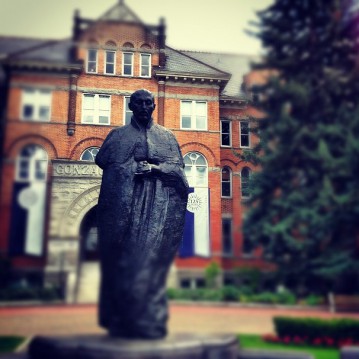
Gonzaga University President Thayne McCulloh has approved Gonzaga’s first comprehensive Climate Action Plan, which aims for Gonzaga to achieve climate neutrality — zero emissions — by 2050, said Brian G. Henning, associate professor of philosophy and co-chair of Gonzaga’s Advisory Council on Stewardship and Sustainability in a press release.
Gonzaga will work to achieve this goal by reducing emissions, from 2009 baseline levels, 20 percent by 2020 and 50 percent by 2035, according to the plan.
“Care for the planet is an important emphasis for the Church and the Jesuits; thus, Gonzaga’s mission calls us individually and collectively to be good stewards of the Earth’s resources,” McCulloh said. “This Climate Action Plan provides a road map for carrying out our commitment to sustainability. While it is ambitious, I have every confidence that the Gonzaga community will respond to the challenges it presents, given the importance of what is at stake. I am grateful to all those involved in developing this plan.”
The plan also aims to broaden sustainability education across the curriculum and in co-curricular programs. For example, Gonzaga is actively seeking to create a Sustainable Business Concentration within the School of Business Administration. In co-curricular activities, the Climate Action Plan envisions a “Green Fund” to support student-generated sustainability initiatives.
“Sustainability and care for the environment are vital questions for our time and so appropriately addressed through curricular and co-curricular avenues. It is particularly fitting for Gonzaga as a Jesuit university to take up these issues,” said Gonzaga Academic Vice President Patricia O’Connell Killen. “The sustainability across the curriculum faculty learning community and initiatives like the envisioned ‘Green Fund’ are two steps through which the faculty, staff and students take up these questions not as ‘add-ons’ but as an integral part of whatever they study and however they envision their lives for today and into the future.”
The full “Gonzaga University Climate Action Plan: 2013-2035 Roadmap” can be found online at Gonzaga’s sustainability website.






